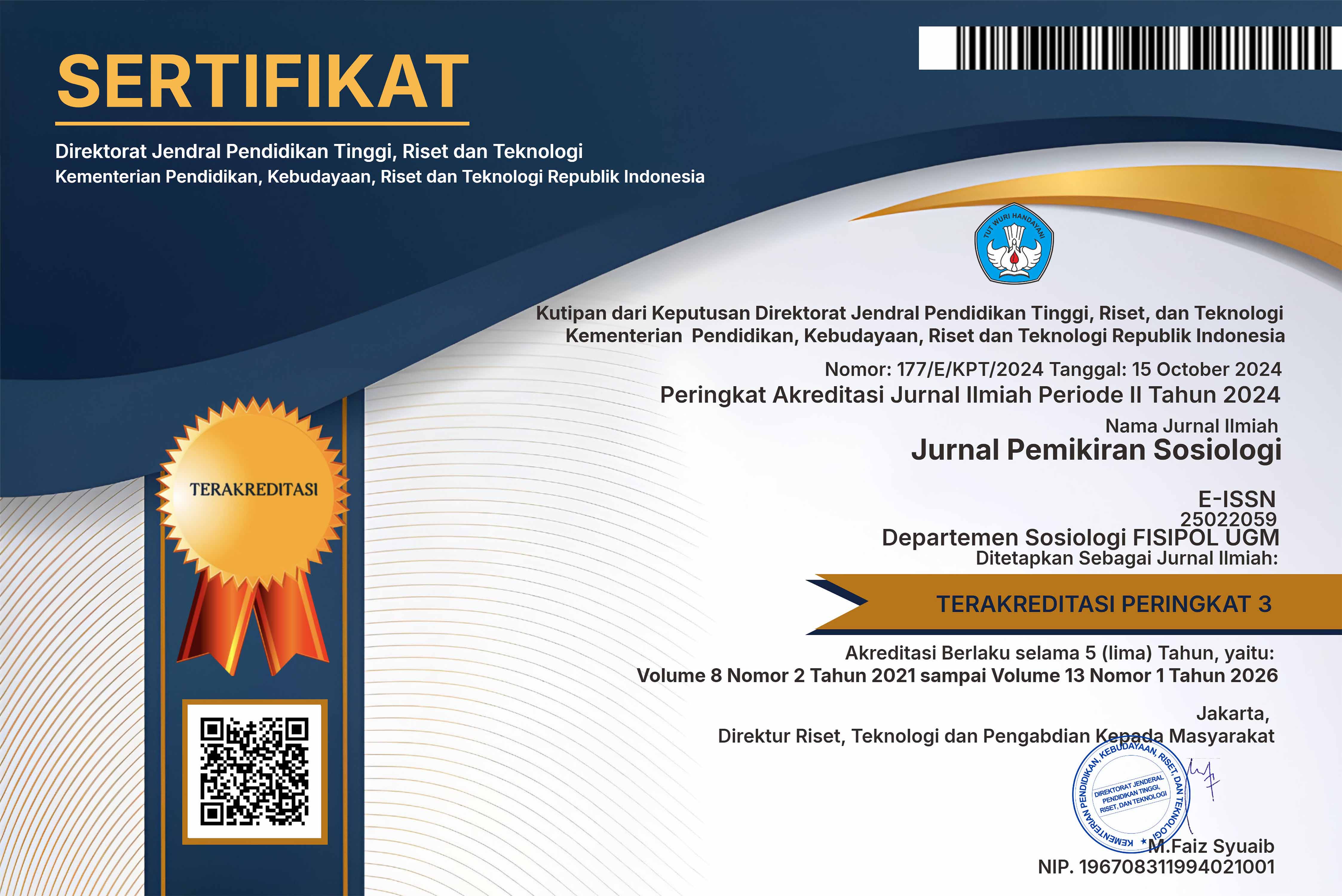- Focus and Scope
- Section Policies
- Peer Review Process
- Open Access Policy
- Archiving
- Screening Plagiarism
- Statistic Download Article
Focus and Scope
Jurnal Pemikiran Sosiologi promotes the development of social science through covering various topics including:
- Space and Urban Studies
- Democracy, Citizenship and Social Movement
- Digital Society and Culture
- Generation, Mobility and Identity
- Rural Ecology and Social Transformation
- Inclusion, Justice and Social Policy
- Conflict, Security and Sustainable Development
- Local Dynamics and Globalization
- Gender and Social Theories*
- Climate Change and Food Security
Section Policies
Articles
Introduction
Book Review
Peer Review Process
Manuscripts submitted to Jurnal Pemikiran Sosiologi will undergo an initial screening by the Board of Editors to ensure their accordance with the writing guideline, focus, and scope. The manuscripts will be reviewed using a double-blind peer review process which means that both the reviewers’ and authors’ identities are concealed from each other throughout the review process.
Desk Review. At the desk review stage, manuscripts will be examined to ensure that they have met the writing guideline, focus, and scope. If they do not meet the conditions, the author will be given the opportunity to revise their manuscript according to the given criteria. However, there is also the possibility that the manuscript will be directly rejected.
Peer review. When the manuscript has passed the desk review stage, it will then be delivered to two reviewers who are experts in the field of the submitted manuscript. The review process will be done within 3 weeks. Manuscripts that did not successfully pass the desk review process will not proceed to this stage.
Reviewer’s decision. The reviewers will provide the following recommendations:
- Accepted; means that the manuscript is acceptable for publication
- Accepted with minor revisions; means that the manuscript is acceptable for publication once it is revised in response to the reviewers’ concerns
- Accepted with major revisions; means that substantive inadequacies in the manuscript, such as data analysis, the main theory used, and rewriting of paragraphs, need to be revised
- Rejected; means that the manuscript is not acceptable for publication or the given reviews relate to very basic issues
The reviewer’s decision will be considered by the Board of Editors to determine the ensuing process of the manuscript.
Revision Stage. Once the manuscript has been received with notations of minor or major revisions, it will be returned to the author with a review summary form. For manuscripts accepted with major revisions, authors are allotted 4 weeks to revise. Whereas for manuscripts accepted with minor revisions, 2 week is allotted for revision. When returning the revised manuscript, the author is required to fill in and attach the review summary form.
Final decision. At this stage, the manuscript will be re-evaluated by the Board of Editors to ensure that the author has revised in response to the reviewers’ concerns. In this final decision, the manuscript may still be rejected if the author did not seriously conduct the revisions necessary.
Proofread. Once the manuscript has been deemed acceptable by the Board of Editors, it will undergo a proofreading process to maintain linguistic quality.
Publication confirmation. At this stage, the final layout of the manuscript will be resent to the author to ensure that the content is in accordance with the author’s writing. At this stage, the author may revise any typographical error found in the final manuscript. Once confirmation from the author is given, the Editorial Secretary will process the manuscript for online publication on the website as well as print publication.
The published article will appear in the latest issue of Jurnal Pemikiran Sosiologi. The order of articles in each issue is subject to the editorial team's decision. As long as an issue hasn't been published, its article composition still possibly changes. Thus, some accepted articles will be published right in the next issue, while others will be saved for upcoming issues.Open Access Policy
This journal provides immediate open access to its content on the principle that making research freely available to the public supports a greater global exchange of knowledge.
Archiving
This journal utilizes the LOCKSS system to create a distributed archiving system among participating libraries and permits those libraries to create permanent archives of the journal for purposes of preservation and restoration. More...
Screening Plagiarism
The submitted manuscript would be check for plagiarism using Turnitin.
Statistic Download Article
Statistic download using ALM Plugin, statistic will show on every article page.

















